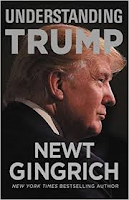A war is
going on for America. This war, a type of world war 3, is presently taking
place not with guns and bombs but with traitors in the ranks. It seems a nation
is defined by its borders and language and culture. Such is the premise of this
book.
Every
president enters the office with the unpaid bills of the administration before.
Obstacles stand in the way that must be worked with and conquered.
Each
administration needs to make game plans and march forward to implement them.
Such is what we have with Trump and his years in the White House.
He was
placed in the White House because his vision resounded with enough people to
get the votes. Now we must see that he is able to do that. Trump must carry out
his promises made that got him elected. And he must watch out for the hidden
traps. One such trap was the advice he got from Senator Dole to contact Taiwan,
which made China mad and didn’t succeed in getting America any points in
foreign policy.
We need to
know what landmines have been planted and help navigate him through them.
Savage calls it a war. In this book he names each obstacle laid by the previous
administrations one by one. He doesn’t sweeten the list. What he does is lay
out a guide to the mine fields, so we can choose to aid the President in the
future war.
He is not a
politician and will make some political blunders, but he seems to be a promise
keeper. We should allow him the space. I am sure we shouldn’t expect one
hundred percent of what he promised but even if he can fulfill a good amount of
the promises it is more than others have done.
He needs to
build the wall. Something we can see and touch and regulate. This can cut down
on the diseases that are brought in by our illegal immigrants.
He will need
to bring jobs back that have been outsourced. “It is Bill Clinton and NAFTA
that put most middle Americans out of work.” Savage says. We need to bring jobs
back.
We need to
interface with Russia. Savage suggests
some ways we can do that.
These are
just a few of the ideas taken up in this book.
This is an
important book and should be read by as many people as possible. It doesn’t matter
what political party you claim.
This book is
dangerous as it might expand your mind and you may start thinking. And when
that happens—watch out.
The last chapter
gives you solutions or bullet points to work with in formulating a battle plan.
This book should be on every true patriot’s bookshelf. Read it often and apply
it.










